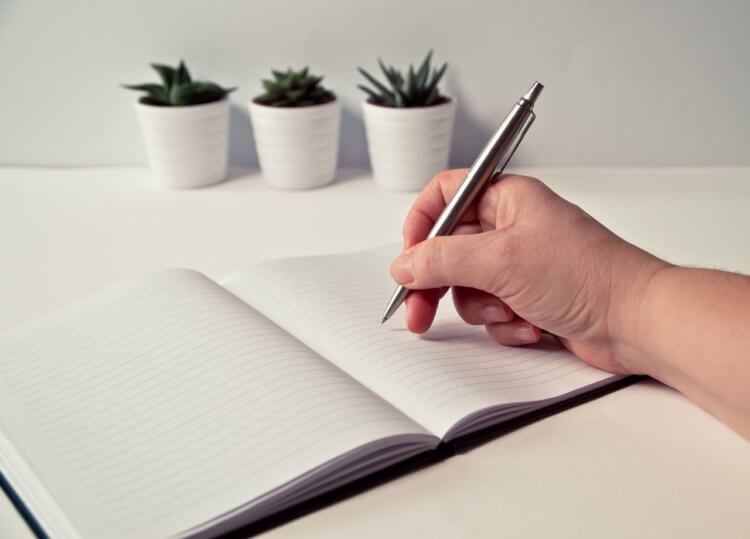Tips for Writing a Persuasive Family Law Declaration
What are the top legal writing tips that any lawyer and legal professional could benefit from? Whether or not y'all're a confident author, legal writing is an important skill for whatever lawyer, no matter what area of practice you choose. From courtroom documents like motions, discovery documents, briefs, and memoranda to in-office communication like letters, customer emails, internal memos, and more—it's a whole lot of writing.
Lawyers as well need to brand sure their writing style, tone, and voice in legal documents and communication are appropriate for a wide range of audiences such as courts, judges, and clients.
Documents filed at courtroom, including briefs and memoranda, involve researching facts and cases, analyzing situations, presenting information, and making an argument. To exist a skilled legal writer, lawyers need to exist authoritative, apparent, and persuasive in their writing. The following legal writing tips will help you improve your writing.
What is legal writing?
Legal writing is the type of writing used for documents that relate to legal matters. This includes briefs, contracts, memorandums, motions, and more.
The purpose of legal writing is usually to persuade—the tone and style you volition use depends on who you're writing for. As a legal writer, you should be able to switch between the legalese required for officials such as a judge and plain language required for a client.
Whether y'all consider yourself a writer or not, legal writing is a necessary and important skill required for all legal professionals. From paralegals to lawyers to secretaries, legal writing is applicable to every legal professional person.
Legal writing tips to help you get started

Tip 1: Understand your purpose
What is the first and arguably most important legal writing tip? Understand the purpose of your writing.
Ask yourself: Why are yous writing what you are writing? What are you hoping to attain? What is the issue you wish to achieve?
Writing a contract may serve to inform, while courtroom documentation may serve to persuade, and client intake documentation may serve to evaluate. The construction, tone, and vocalisation of the document will modify depending on the purpose of your legal writing. Understanding that purpose will help you write better.
Tip 2: Sympathize your audience
Knowing who y'all're writing for will help shape the structure and tone of your slice. A gauge, some other attorney (including an opposing attorney), or a client will accept dissimilar experiences and expectations that inform how they read your writing.
Keep the post-obit in heed, in addition to their role and relationship to you: Historic period, income and economic status, level of education, values, and how much they already know about what y'all're writing near. This volition assistance you determine your tone, style, and level of particular to include in your writing.
Tip 3: Do your inquiry

Expert legal writing requires researching and incorporating relevant legal precedents into your documents. Earlier y'all get-go writing, thoroughly read whatever material provided to understand the legal issues and are cognizant of the applicative jurisdiction.
Every case and certificate is different, but keeping some bones rules for legal research in mind will set you up for success. Some helpful legal research tools include FastCase , Legal Information Found (LII), and CourtListener .
Depending on the piece y'all're writing, you may also discover secondary sources such as legal dictionaries , law reports, and academic journals helpful in your research. For example, you'll need both the primary and secondary sources to institute mandatory and persuasive authority .
Tips for the legal writing procedure
Tip four: Create an outline
One of the most helpful legal writing tips to better your legal writing skills is organizing your research into an outline. Starting with an outline will help go on your writing organized and focused.
A good outline starts by detailing the topic, putting the most important information at the peak. Then, affluent out the principal points with the supporting details while making sure the transitions between points make sense.
Legal writing becomes much easier and less intimidating once you take an outline to help organize your ideas and guide your writing procedure.
Tip 5: Put words on the page

Even with a detailed outline, getting started tin be difficult. Author's block is a real thing that fifty-fifty the most seasoned legal writers suffer from. Simply don't worry virtually getting it perfect on the first attempt—that's what editing and proofing are for.
On your first draft, focus on capturing the correct information. Brand sure the data is complete and sufficient, and that the content flows nicely from one section to the next. Give yourself every bit many drafts as y'all need before your deadline. Also, give your writing some room to breathe by taking a break and coming back to information technology with fresh eyes.
Always think that you can clean your writing upwardly in the editing stage—you don't have to go the formatting perfect on your offset endeavour.
Tip 6: Be aware of content structure
The best fashion to structure whatsoever slice is by writing from the tiptop down. Start past showing the reader what you're writing near and why, so provide the arguments to back up your case.
Pick your all-time or well-nigh persuasive arguments to focus your writing on, so filter additional, supporting arguments thereafter. Use headings to intermission up sections and transition from one argument to the next, and start new sections with summary sentences. Where appropriate, it also may be helpful to use lists and bullets to make your writing scannable for the reader.
Tips to help y'all write amend

Tip vii: Exist clear
When writing any type of legal document, land your point directly and conspicuously within the first few sentences to help guide the reader along. Assume the reader has very little time or patience, that they hate to read, and that they're only going to read the first 200 words. What you say in those 200 words will help them make up one's mind to continue reading.
A few other legal writing tips to keep in mind:
- Active vocalisation: The subject did something, rather than something was washed to them. E.yard., "Wendy consulted with her lawyer" is an example of agile voice, whereas "The lawyer was consulted by Wendy" is an example of passive vocalization.
- Avoid double-negatives: For instance, "This is not, not the best way to write."
- The Oxford comma : When listing items like judges, magistrates, and clients.
- Employ adverbs and adjectives sparingly: Clearly, this is an exaggerated case.
- Consequent tenses: Past tense is most commonly used but sometimes nowadays tense makes the virtually sense.
- Avoid split up infinitives : For example, Gently push vs. push button gently.
- Avoid gender-specific terminology: When in doubt, "they" is universal.
- No slang and hyperbole : This is inappropriate and unnecessary.
- Be accurate and specific: For instance, employ a specific date instead of "recently."
Tip 8: Use jargon only when appropriate
Using jargon, including legal terms, is only advisable in some contexts. For case, using besides much "legalese" with a client who is non well-versed in specific legal matters may cease upward confusing them and muddling the conversation with unnecessary questions.
While in court documents, it's completely appropriate (and sometimes even necessary) to use the correct jargon and terminology, since another attorney, judge, or magistrate will be your reader.
When appropriate, strive to use apparently linguistic communication in your legal writing while showing that you empathise jargon and can present it in easy-to-understand ways for the reader.
Tip 9: Edit and proofread
The legal writing process doesn't just terminate when the piece is finished. I of the most common mistakes writers brand is non budgeting for the editing phase—a thorough editing and review process takes time.
It'south always helpful to have somebody else edit and proofread your work, simply you lot should be able to take care of the nuts yourself. Master spelling and grammar basics—lawyers who present documents with spelling and grammatical errors will be seen as less credible and lacking in attending to item.
Understandably, it can be difficult to catch spelling and grammatical errors immediately. Once you've read your document several times, you'll commonly glaze over your own mistakes. Another helpful legal writing tips for the editing process include reading your writing aloud or reading information technology astern to help strop your focus and spot errors you'd otherwise miss.
Tips to level up your legal writing
Tip x: Use helpful tools and apps

No matter what medium or certificate y'all're writing, all expert writers should always use spell check at a minimum. Advances in writing technology have too made legal writing much easier. For instance, writing apps like Grammarly and Ginger can help you catch grammar, spelling, and other language mistakes.
If you don't take an editor always available to help proofread your legal writing (which most usually don't), text-to-oral communication apps such as Linguatec and Natural Reader tin can aid read your documents out loud. This will help spot errors and awkward passages.
While some of these services are free, many of them will accept a paid version to unlock extra features. Consider investing in some of these paid versions if your job requires a lot of writing—it'southward worth information technology to bring your legal writing skills to the next level.
Tip eleven: Read other writers' work
The most common piece of advice writers give for those looking to improve their writing skills is to read—this rings true for any kind of writing. To improve your legal writing skills specifically, find expert legal and business concern writers and read their piece of work. This could be legal documents, but also books , blogs , and articles .
Past studying and understanding how others write and structure their pieces, you'll get a feel for the general format of a legal document. Yous tin can then contain your ideas and writing style. You could likewise ask colleagues for examples of their piece of work or join communities and forums for examples.
Legal writing is an ongoing journeying
Every bit y'all embark on this legal writing journey, call up that information technology may exist challenging to go a great legal writer overnight. Like with whatever arts and crafts, good legal writing is a skill and ongoing process that you build the foundation for and improve on.
The writing procedure is circuitous and extends beyond just putting words to paper. Researching, writing, and editing are all important skills for good legal writing. The more you practise writing, the easier it gets and the better your work volition be over time.
Use the above legal writing tips as your starting indicate. Retrieve to always be open to and use feedback and effective criticism.
Nosotros published this web log postal service in April 2021. Final updated: .
Categorized in: Business concern
Source: https://www.clio.com/blog/legal-writing-tips-for-lawyers/
Post a Comment for "Tips for Writing a Persuasive Family Law Declaration"